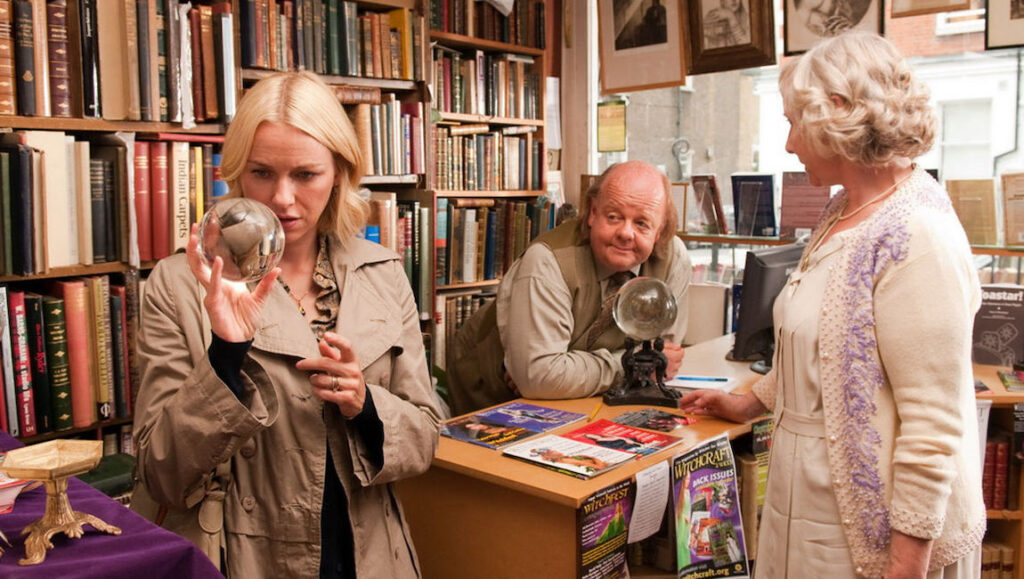Think about these: Annie Hall, Sleeper, Hannah and Her Sisters, Crimes and Misdemeanors, Manhattan, and Purple Rose of Cairo. Are you smiling? Are you basking in the glory of these modern-day masterpieces? Now think about: Anything Else, Whatever Works, Hollywood Ending, and Scoop. Sorry, did that kill your high? There is no arguing that Allen is one of the great American filmmakers, but being prolific has not helped his career; if you make five times as many movies as anyone else, you’re going to spit out some clunkers. The fact that all of the duds have come over the last fifteen years makes it harder to appreciate stronger recent offerings like Match Point and Vicky Cristina Barcelona. With his latest, You Will Meet a Tall Dark Stranger, Woody conjures up memories of the good ol’ days without completely hitting his mark. Allen’s favorite topics are on display: we get neurotic characters exploring marital infidelity, mid and late-life crisis, and, most importantly, the meaning of existence.
The story centers on the screwed up lives of two London couples. Alfie (Anthony Hopkins) wakes up one day with a revelation: he’s old, and getting older. In a panic, he dumps his wife Helena (Gemma Jones) and shacks up with young hussy Charmaine (Lucy Punch). Devastated by her husband’s childish behavior, Helena turns to a suspicious psychic for answers. Meanwhile, Alfie and Helena’s daughter Sally (Naomi Watts) swims in her own ocean of dysfunction. Her husband Roy (Josh Brolin) is a washed-up novelist. Employment-challenged with a wandering eye, Roy shuffles around, disheveled and despondent, muttering “How am I going to finish my book?” to no one in particular. Imagine Jeff Lebowski without the charm. The film follows these unsettled folks as they question the choices they’ve made and stumble through life looking for something better.
The top-notch cast keeps the story interesting. Watts anchors the film emotionally as a woman who wants more and deserves better. Her point of view resonates throughout and keeps us connected amidst this sea of lost and confused souls. Brolin is unpleasant, annoying and funny as the self-centered writer who somehow charms his beautiful neighbor, Dia (Freda Pinto). The rest of the actors, including Antonio Banderas as Sally’s gallery-owner boss, deliver engaging, believable performances that keep the drama chugging along at a healthy clip. So what’s the problem? Well, to put it bluntly, it’s the writing. The trouble begins with a narrator’s voice in the opening scene. Narration isn’t inherently bad, but when it handles basic exposition, it’s distracting and lazy. Why can’t we learn about the situation and characters directly from the actions of our protagonists? The bigger problem though is the dialogue. It’s as if Woody forgot how people actually talk. Despite the best efforts of his A-list cast, conversations come off sounding like actors reading lines.
Of course, Allen’s dialogue has always been stylized. Y’know, characters stammer, refer to 1940s Jazz and end up sounding like a certain neurotic filmmaker. But here, because the situations and characters are intriguing enough, we want these people to cut down on the self-analyzing monologues and mild jokes and go with the flow of the action. As a comedy, You Will Meet a Tall Dark Stranger is not particularly funny; jokes about Viagra and venereal disease fall flat. And while the characters are often put in absurd situations, the guffaws are few and far between. However, as an existential examination of getting old, being married, and living with the life we’ve created, the film works. These are the issues that matter to Woody and even clunky dialogue and madcap moments can’t get in the way of the importance and intrigue of the filmmaker’s ideas and questions. While it’s not going to end up on a list of Woody’s all-time greats, You Will Meet a Tall Dark Stranger offers a sweet taste of Allen’s unparalleled obsession with love and death that all comes off nicely, just like the good ol’ days.


Comments are closed.